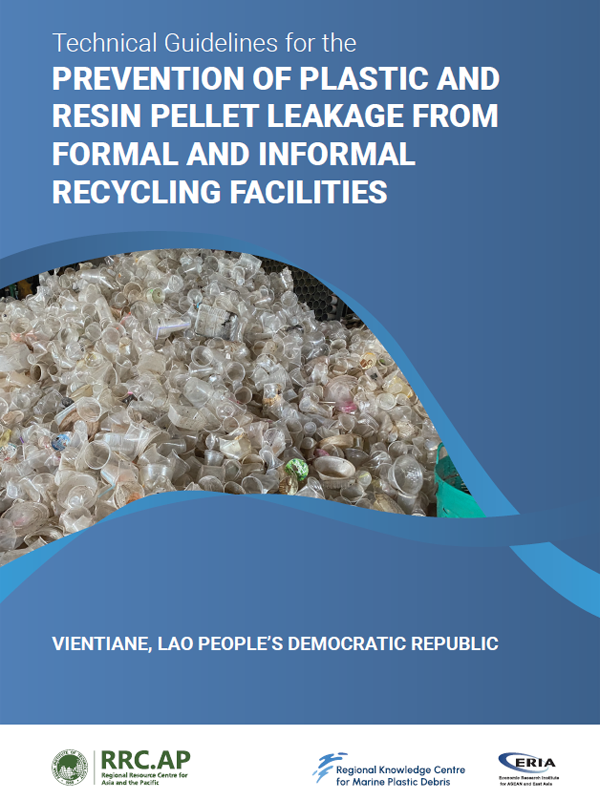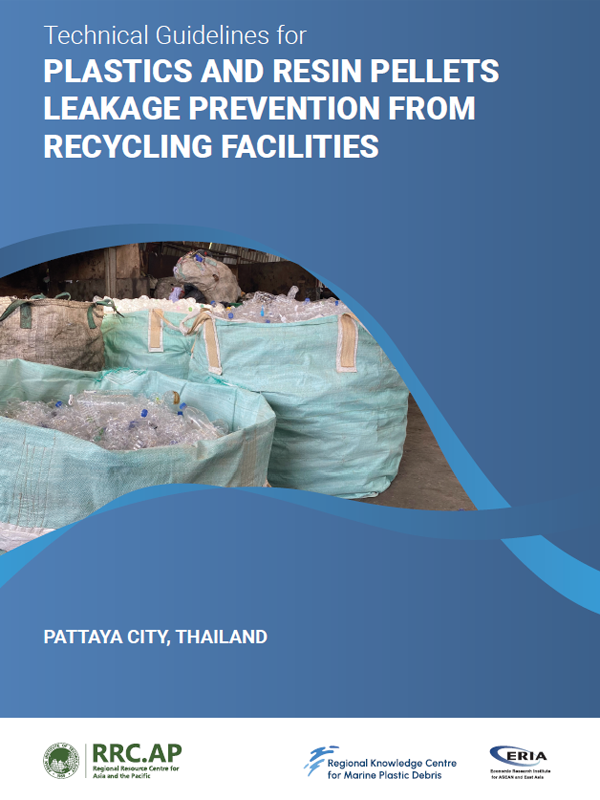REPORTS & PUBLICATION
REPORTS

Technical Guidelines for the Prevention of Plastics and Resin Pellet Leakage from Formal and Informal Recycling Facilities, Vientiane, LAO People's Democratic Republic
2024 | Asian Institute of Technology, RRC.AP
The guidelines aim to fill knowledge gaps and promote contextually appropriate best practices. They will also encourage industry actors to implement measures to prevent and contain plastic and pellet leakages. Based on the findings of a preliminary assessment of the post-consumer plastic recycling value chain, which analyzed primary sources of plastic loss and leakage, including technology applications, resource availability, access, and regulatory and policy gaps, these guidelines are designed.

Technical Guidelines for Plastics and Resin Pellets Leakage Prevention from Recycling Facilities, Pattaya City - Thailand The overall objective of the technical guideline is to prevent plastics and
2024 | Asian Institute of Technology, AIT, RRC.AP
The overall objective of the technical guideline is to prevent plastics and resin leakage into the marine environment through the promotion of best technologies and practices at resin-producing factories and informal recycling facilities in Pattaya city.

Municipal Waste Management Report: Status-quo and Issues in Southeast and East Asian Countries
2010 | RRC.AP
Solid waste management is one of the major environmental burdens particularly in megacities of many developed and developing Asian countries. An alarming rate of solid waste generation trends can be seen parallel to urbanization, industrialization and economic development. This environmental burden continues to be a major pressing issue threatening the environment and health of the people. Unless environmental measures are introduced and effectively enforced, continuing burdens of solid waste management will be inevitable. This report presents and discusses the status-quo and issues of Municipal Waste in 14 countries in Southeast and East Asia. Aspects of Municipal Solid Waste (MSW) included herein are generation and composition, policies and regulations, economic instruments, current practices of MSW and other management strategies. The report also presents some propositions and policy recommendations in order to determine regional collective actions on the status-quo and issues regarding Municipal Waste.

Health Care Waste Management Proceedings Report 2012
2012 | RRC.AP
Solid and Hazardous waste is increasingly becoming a major environmental burden of most urban and industrial areas. An alarming rate of solid and hazardous waste arising in Asia and the world has been witnessed parallel to urbanization, industrialization and economic development. Issues such as the increase in volume, variety of soid wastes, their qualitative diversification, and the trans-boundary movement of hazardous materials and soaring prices of resources now bound. The Thematic Working Group on Solid and Hazardous Waste (Waste TWG) of the Regional Forum on Environment and Health in Southeast and East Asian Countries was established in 2007 to address many of these problems. The goal of Waste TWG is to ensure environmentally sound management of solid and hazardous waste, particularly municipal and medical waste, and promote the 3R's.

Summary report: Waste Management in ASEAN countries
2017 | RRC.AP
This summary report examines the waste management landscape in 10 Association of Southeast Asian Nations (ASEAN) Member States. This report begins with the statistics on the trends of population growth, urbanization, and economic growth in each of the ASEAN countries, which is then followed by an overview of the waste generation, collection, treatment & recovery, and disposal statistics, and associated environmental, technical, and governance (institutions, policy, regulations) factors in the waste sector. The report also identifies the existing waste management challenges and gaps therein, and sets out recommendations.

Regional Study on Mercury Waste Management in ASEAN Countries
2017 | RRC.AP
The scoping study serves as a preliminary assessment of the current mercury waste management systems and practices in the ASEAN member states (AMS). It is aimed at identifying the current available sources of the relevant information, summarizing the essential information, and identifying gaps of information, challenges, needs and opportunities for further studies or actions. This study covers all AMS jurisdictions, while sector-wise, it focuses on Mercury in the Artisanal and Small-scale Gold Mining (ASGM); Mercury waste from the chemical manufacturing industry using the Chlor- Alkali process; as well as mercury in fluorescent lamps from industry and household sources. In terms of the Hazardous Waste Management (HWM) aspects under the BC Art. 4 and MC Art. 11, the study covers policies; legislative and regulatory framework; institutional framework; main sources/generators, waste prevention and minimization; handling, separation, collection, packaging and labelling, transportation, storage; treatment and disposal; and contaminated sites.
 The kNOwWaste Knowledge Platform was developed through a Project Cooperation Agreement funding by UNEP on 2016. The platform provides data and information on holistic waste management to stakeholders in Asia and the Pacific region. The platform was developed with the following aims: generate and consolidate data or information on holistic waste management, transform data into easily comprehensible outputs for use by key stakeholders, map out and disseminate information on international waste management projects under the GPWM and UNEP projects as well as other international partners, and provide capacity building support through dissemination of data or information support for relevant stakeholders on holistic waste and waste management system.
The kNOwWaste Knowledge Platform was developed through a Project Cooperation Agreement funding by UNEP on 2016. The platform provides data and information on holistic waste management to stakeholders in Asia and the Pacific region. The platform was developed with the following aims: generate and consolidate data or information on holistic waste management, transform data into easily comprehensible outputs for use by key stakeholders, map out and disseminate information on international waste management projects under the GPWM and UNEP projects as well as other international partners, and provide capacity building support through dissemination of data or information support for relevant stakeholders on holistic waste and waste management system.
 2025 © Regional Resource Center for Asia and the Pacific (RRC.AP). All Rights Reserved.
2025 © Regional Resource Center for Asia and the Pacific (RRC.AP). All Rights Reserved.
